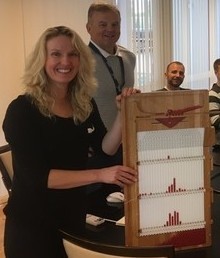
I was very impressed with Sissel's Lean Six Sigma knowledge. She makes it easy to identify improvements and create results.


Reliable measurements are necessary to make good decisions.
This course teach you how to use Measurement System Analysis (MSA) to consider precision, accuracy, sensitivity, and capability of your measurements.
Lean Tech offers virtual and physical classroom training:
You learn to use Measurement System Analysis to assess variation in the measurement system (a measurement system can include the measurement method, measuring instrument and persons performing the measurement).
Reliable measurements are necessary to make good decisions.
You learn to create Control Charts to determine various characteristics of your measurement system (repeatability, reproducibility, stability, sensitivity & capability).
We use excel to do the MSA (other statistical tools like Minitab, JMP or Sigma XL can be used for training arranged on request).
It is recommended to complete a course in Statistical Process Control - SPC before taking this course.
This training enables you to:
You learn to assess precision, accuracy, stability, sensitivity and capability of a measurement systems.
We create a Process map of the Measurement method to better understand the method.
The Process map includes variables that contribute to variation. These variables are possible root causes of Measurement Systems that are not capabel.

The Galton board is used to provide a visual understanding of histogram, average, variation and simple statistics.
We generate data from the Galton board and create control charts.
We carry out a measurement system analysis using the data from the Galton board.
We determine repeatability, reproducibility, sensitivity and capability.
We discuss applications that are relevant to you.
Courses can be arranged on request and customized to your business needs.
Your own data can be used in examples and exercises.
Open courses are arranged according to the Course Calendar.
You can start e-learning when you want. You have access for a year and unlimited attempts to successfully complete multiple-choice exam.
Lunch, refreshments, and drinks during classroom training are included, and you receive a course completion certificate.
Course location varies; check "Place" in Course Calendar.
Lean Tech is located at Igloo Innovation at SNØ (Snøfonna 5, 1470 Lørenskog) and organizes courses here.
We have an agreement with Thon Hotels and organize courses in other locations as needed.

Sissel Pedersen Lundeby is IASSC (International association for Six Sigma certification) accredited trainer associate:
"This accreditation publically reflects that you have met the standards established by IASSC such that those who participate in a training program led by you can expect to receive an acceptable level of knowledge..."
Sissel has a Master in Chemical Engineering and more than 20 years' experience within manufacturing and environmental technology. She has practiced Lean Six Sigma since 2002, completing Black Belt projects and certification through Cytec (2004) and IASSC (2017).
She use Lean Six Sigma to create measurable results and want her course participants to be successful improving their processes. That's why her training focus on practical application.
"Inspiring, professionally competent, popularize a theoretical discipline"
Espen Fjeld, Commercial Director at Berendsen
"Academic highly skilled and clear performance. Fun and builds trust"
Jon Sørensen, Production Manager at Berendsen
"10/10 good at reaching everyone"
Erlend Stene, Sales leader at Berendsen
"Clear and well presented. Good at asking questions and listen (check understanding)"
Morten Bodding, Production Manager at Berendsen
"Made a difference, engaged and skilled"
- Participant from EWOS
"You are inspiring, positive and professionally skilled"
- Participant from EWOS
"Clear presentations and well explained"
"I thought it was very rich, with good examples that made me reflect"
Lean Tech AS | Snøfonna 5
0047 481 23 070
Lørenskog, Norway
L - Look for solutions
E – Enthusiastic
A – Analytical
N - Never give up
